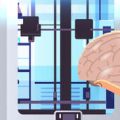What Is Cognitive Decline?
Cognitive decline refers to a noticeable and measurable decrease in mental abilities, including memory, thinking, reasoning, and judgment. While everyone experiences some changes in cognitive function as they get older, cognitive decline goes beyond what is expected from normal aging. It can impact daily life, making it harder for older adults to manage tasks that were once routine.
Normal Aging vs. Cognitive Decline
| Normal Aging | Cognitive Decline |
|---|---|
| Occasional forgetfulness (like misplacing keys) | Frequent memory loss that disrupts daily life |
| Slower recall of names or words | Difficulty finding words or following conversations |
| Able to make decisions independently | Poor judgment or trouble making decisions |
| No significant impact on daily activities | Trouble managing finances, medications, or household tasks |
Common Causes of Cognitive Decline in Older Adults
- Alzheimer’s Disease: The most common cause of dementia, leading to progressive memory loss and confusion.
- Vascular Dementia: Caused by reduced blood flow to the brain, often after a stroke or series of small strokes.
- Lewy Body Dementia: Marked by abnormal protein deposits in the brain, causing movement and thinking problems.
- Parkinson’s Disease: A movement disorder that can also affect thinking and memory over time.
- Mild Cognitive Impairment (MCI): Noticeable changes in cognition that are greater than expected for age but not severe enough to interfere significantly with daily life.
- Other Medical Conditions: Such as depression, thyroid disorders, vitamin deficiencies, or medication side effects.
Understanding Early Signs Matters
Recognizing the differences between normal aging and cognitive decline can help families and caregivers support their loved ones more effectively. Early identification allows for timely medical evaluation and planning for future care needs.
2. Recognizing Early Warning Signs
Understanding What to Look For
Identifying early warning signs of cognitive decline in older adults is crucial for timely support and intervention. Sometimes, these changes can be subtle and easily mistaken for normal aging. However, paying close attention to specific behavioral, emotional, and memory-related symptoms can make a big difference.
Key Symptoms to Watch For
| Category | Common Signs | Everyday Examples |
|---|---|---|
| Memory Issues | Frequently forgetting names, appointments, or recent events; repeating questions or stories. | Your loved one asks the same question multiple times during a conversation or forgets they’ve already paid the bills this month. |
| Behavioral Changes | Noticeable shifts in mood or personality; withdrawal from social activities; increased irritability. | A previously outgoing grandparent suddenly avoids family gatherings or becomes easily frustrated with simple tasks. |
| Difficulty with Daily Tasks | Trouble managing finances, following recipes, or remembering steps in familiar routines. | An older adult has trouble balancing a checkbook theyve managed for years or gets lost driving to a familiar grocery store. |
| Poor Judgment | Making unusual decisions about money or personal safety; neglecting hygiene. | Your loved one gives away large sums of money to telemarketers or forgets to bathe regularly. |
| Language Problems | Trouble finding words, following conversations, or understanding what others are saying. | An older adult pauses often while speaking because they can’t find the right word or struggles to keep up with group discussions at dinner. |
| Emotional Changes | Anxiety, depression, sudden mood swings. | Your parent becomes tearful for no clear reason or expresses feelings of hopelessness more frequently. |
When Everyday Changes May Signal More Than Aging
It’s normal for everyone to misplace their keys occasionally or forget a name now and then. However, when these issues begin to interfere with daily life or relationships, it’s important to take them seriously. Families and caregivers should watch for patterns—are these changes happening more often? Are they becoming more disruptive?
Practical Tips for Families and Caregivers:
- Keep a journal: Write down specific examples of concerning behaviors as they happen. This can help doctors see patterns over time.
- Talk openly: Gently discuss your observations with your loved one. Express concern and offer support rather than criticism.
- Involve professionals: If you notice consistent warning signs, schedule an appointment with a primary care provider for further evaluation.

3. Understanding the Stages of Cognitive Decline
Cognitive decline in older adults is a gradual process that affects thinking, memory, and everyday functioning. For families and caregivers, knowing what to expect at each stage can make a big difference in how you provide support and plan for the future. Below is a breakdown of the typical stages, the changes you might notice, and practical ways to adapt as needs evolve.
Common Stages of Cognitive Decline
| Stage | What You Might Notice | How Families Can Adapt |
|---|---|---|
| Mild Cognitive Impairment (MCI) | Occasional forgetfulness, misplacing items, slight trouble finding words, but still managing daily life independently. | Encourage use of reminders (calendars, notes), keep routines consistent, provide gentle support without taking over tasks. |
| Early Stage Dementia | Increased memory lapses, getting lost in familiar places, trouble with planning or organizing, changes in mood or personality. | Create a safe home environment, simplify schedules, help with complex tasks (like finances), start important conversations about future care. |
| Middle Stage Dementia | Difficulty recognizing loved ones at times, needing help with personal care (bathing, dressing), wandering, more pronounced confusion. | Establish clear routines, use labels and signs at home, provide supervision for safety, involve them in simple activities they enjoy. |
| Late Stage Dementia | Severe memory loss, limited communication, significant assistance needed for all daily activities, possible swallowing issues. | Focus on comfort and dignity, work closely with healthcare professionals, provide round-the-clock care or consider assisted living options. |
Tips for Adapting at Each Phase
- Stay patient and positive: Changes can be tough for everyone. Approach each new challenge with compassion and understanding.
- Get organized early: Legal paperwork (like power of attorney) is easier to handle before symptoms worsen.
- Seek community resources: Local senior centers or Alzheimer’s Association chapters offer support groups and helpful programs.
- Keep communication open: Regularly check in with other family members and caregivers to share updates and coordinate care.
- Pace yourself: Caregiving is a marathon—not a sprint. Take breaks when needed and ask for help to avoid burnout.
The Importance of Flexibility
No two people experience cognitive decline in exactly the same way. It’s important to stay flexible and adjust your approach as your loved one’s needs change. Even small adjustments—like labeling household items or simplifying routines—can help maintain independence and dignity for as long as possible.
4. When and How to Seek Professional Help
Recognizing the Right Time to Reach Out
It can be tough for families and caregivers to know when it’s time to get professional help for an older adult showing signs of cognitive decline. Some forgetfulness is normal with aging, but certain changes may signal a more serious problem. If you notice any of the following signs, it’s a good idea to contact a healthcare provider:
| Signs That Warrant Medical Evaluation |
|---|
| Significant memory loss that disrupts daily life |
| Difficulty completing familiar tasks at home or work |
| Confusion about time or place |
| Trouble following conversations or finding the right words |
| Poor judgment leading to unsafe decisions |
| Withdrawal from social activities or hobbies |
| Noticeable changes in mood, personality, or behavior |
Understanding the Diagnosis Process
If you decide to seek help, your loved one will likely go through several steps during the medical evaluation. Here’s what you can generally expect:
| Step | Description |
|---|---|
| Initial Visit | The doctor asks about symptoms, medical history, medications, and family history. |
| Cognitive Tests | Short memory and thinking tests help measure cognitive abilities. |
| Physical Exam & Lab Tests | Checks for underlying health issues that could affect cognition (such as vitamin deficiencies or thyroid problems). |
| Brain Imaging (if needed) | MRI or CT scans may be ordered to look for changes in the brain. |
| Specialist Referral | A referral to a neurologist, geriatrician, or memory care specialist may follow if further evaluation is needed. |
Accessing Local Support Resources in the U.S.
Navigating cognitive decline can feel overwhelming, but many resources are available throughout the United States. Here are some trusted organizations and services that can help families and caregivers:
| Resource | Description & Contact Info |
|---|---|
| Alzheimer’s Association Helpline (800-272-3900) | 24/7 support for information, local programs, and referrals (alz.org) |
| Aging and Disability Resource Centers (ADRCs) | State-specific agencies that connect families with local services (Find your local ADRC here) |
| Eldercare Locator (800-677-1116) | A public service by the U.S. Administration on Aging helping find community assistance (eldercare.acl.gov) |
| Local Memory Clinics and Support Groups | Your primary care provider or local hospital can provide referrals to nearby memory clinics and support groups. |
Don’t Hesitate to Ask for Help
If you’re unsure whether it’s time to reach out, remember that early intervention often leads to better outcomes. Even if concerns turn out to be minor, getting professional guidance can offer peace of mind and helpful strategies for supporting your loved one.
5. Tips for Supporting Loved Ones and Self-Care for Caregivers
Practical Ways to Support Your Loved One with Cognitive Decline
Supporting an older adult experiencing cognitive decline can be challenging, but there are practical steps you can take to help them feel safe, valued, and comfortable. Here are some tips:
| Support Area | Practical Advice |
|---|---|
| Communication | Speak slowly and clearly, use simple sentences, maintain eye contact, and be patient. Avoid arguing or correcting unnecessarily. |
| Daily Activities | Break tasks into smaller steps, offer choices when possible, and encourage independence while providing gentle guidance as needed. |
| Emotional Support | Listen actively, validate their feelings, and offer reassurance. Provide opportunities for meaningful activities like listening to music or looking at family photos. |
| Routine & Structure | Create a consistent daily schedule for meals, activities, and bedtime to reduce confusion and anxiety. |
| Environment Safety | Remove tripping hazards, install grab bars in the bathroom, label important rooms or items, and ensure good lighting throughout the home. |
Creating a Safe and Supportive Home Environment
- Simplify surroundings: Keep frequently used items in easy-to-find places.
- Use reminders: Place notes or use digital reminders for appointments or medications.
- Monitor wandering risks: Consider locks or alarms on doors if wandering is a concern.
- Emergency readiness: Keep emergency contacts and medical information accessible at all times.
Caring for Yourself as a Caregiver
Caring for someone with cognitive decline can be demanding. It’s important to remember your own well-being matters too. Here are ways caregivers in the U.S. often take care of themselves:
| Self-Care Practice | Description & Tips |
|---|---|
| Respite Care | Take breaks by asking friends, family, or professional respite services to step in periodically so you can recharge. |
| Support Groups | Join local or online caregiver support groups—many organizations like the Alzheimers Association offer resources and community connections. |
| Stay Connected | Maintain relationships with friends and family; social support helps reduce stress and feelings of isolation. |
| Pursue Hobbies & Health | Make time for activities you enjoy and prioritize your physical health with regular exercise, nutritious meals, and enough sleep. |
| Mental Health Resources | If overwhelmed, seek counseling or talk to your healthcare provider about managing stress and emotional challenges. |
Quick Reference: Helpful Contacts in the U.S.
- Alzheimer’s Association Helpline: 1-800-272-3900 (24/7)
- Your local Area Agency on Aging (AAA)
- Your primary care provider or mental health professional
- Caregiver support groups through community centers or hospitals
Remember:
You don’t have to do it alone. Asking for help is a sign of strength—not weakness—and it benefits both you and your loved one. Taking care of yourself is just as important as caring for those you love.


